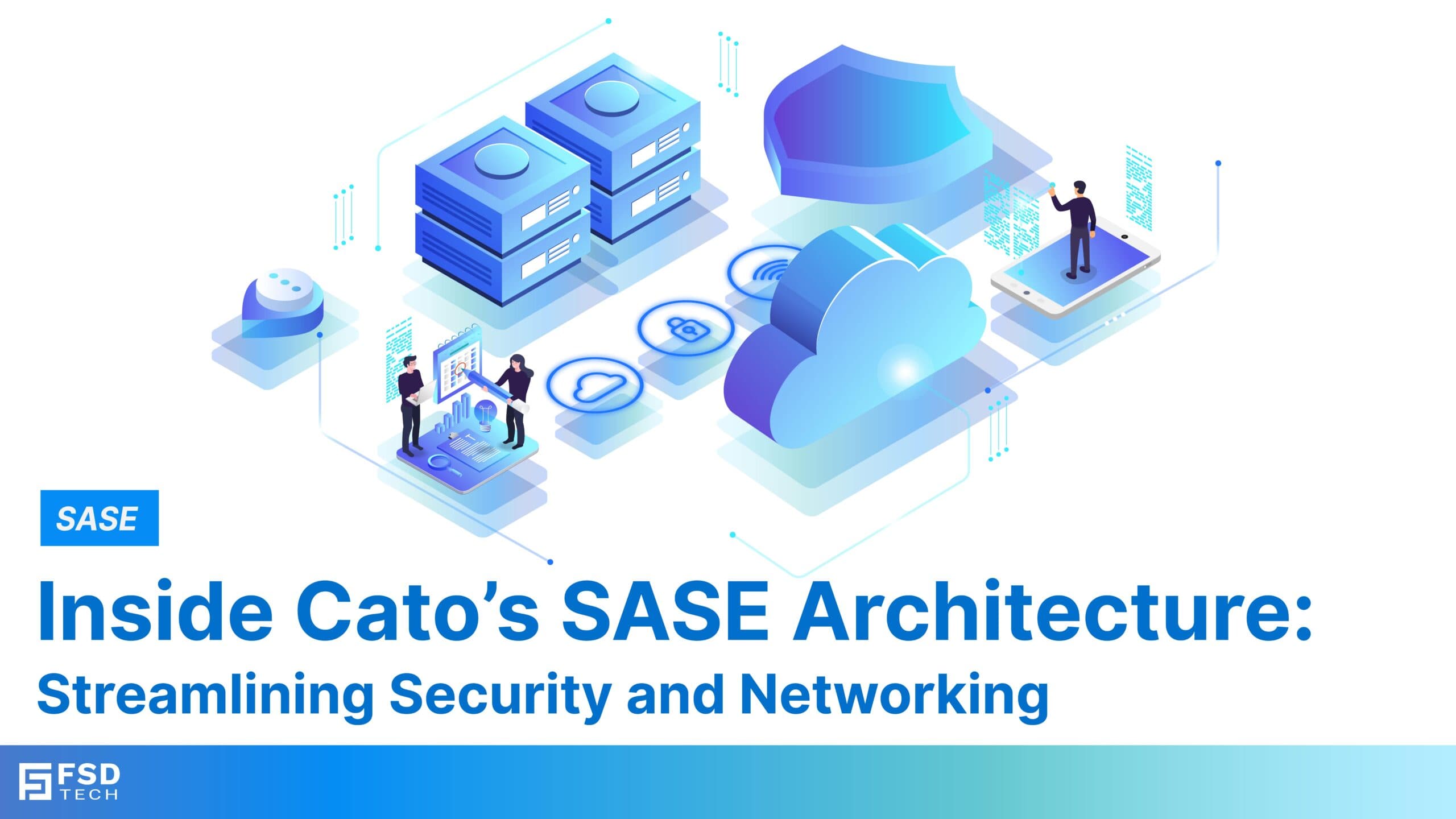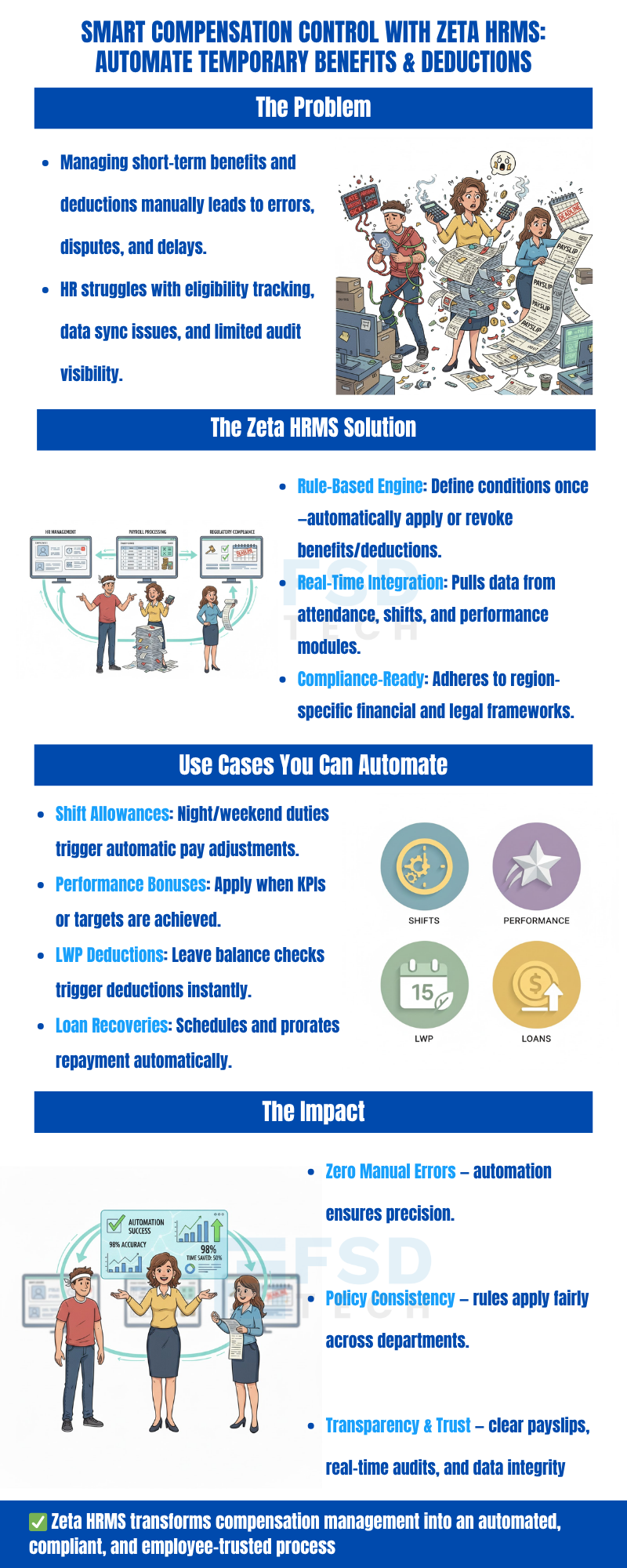
Inside Cato’s SASE Architecture: A Blueprint for Modern Security
🕓 January 26, 2025
Efficient compensation management goes beyond salaries and bonuses—it also includes managing a wide range of temporary benefits and deductions. In growing organizations, especially those with dynamic workforce structures or region-specific policies, it becomes crucial to automate eligibility-based rules for various temporary financial adjustments.
Zeta HRMS simplifies this with a flexible, rules-driven benefits and deduction engine, empowering HR teams to stay compliant, reduce errors, and deliver timely, tailored financial adjustments for every employee.
Let’s explore how Zeta HRMS handles temporary benefits and deductions through eligibility-based rule engines.
Temporary benefits and deductions can range from travel reimbursements, special allowances, incentive bonuses, and shift differentials to leave without pay, late penalties, or short-term loan recoveries. Managing these adjustments manually is prone to errors, delayed processing, and disputes.
Common issues include:
Zeta HRMS solves these challenges with its rule-based benefits engine that dynamically applies or revokes financial entries based on real-time employee attributes and predefined logic.
Temporary benefits and deductions refer to non-recurring or short-term financial entries in an employee’s payslip. These can be scheduled, event-triggered, or based on performance, attendance, or project-based contributions. Examples include:
Benefits:
Deductions:
Zeta HRMS ensures these entries are processed automatically and accurately, reducing the HR team’s manual intervention.
At the heart of this functionality is the eligibility rules engine that lets HR teams define conditions for when a benefit or deduction should be applied. The engine supports:
For example, you can set a rule like:
If an employee from Sales department completes 100% target and has less than 2 late arrivals in a month, apply ₹2,000 bonus in current month’s payroll.
This logic is set once, tested using simulations, and then applied in bulk during payroll processing.
Travel and Conveyance Allowances
Set rules based on travel dates, client visits, or project site check-ins. Zeta can pull this data from attendance/location logs and apply the right amount based on distance slabs.
Shift Allowances
Night shifts, weekend work, or national holiday attendance can automatically trigger additional allowances. Eligibility can also be tied to role (e.g., operations staff only).
Performance-Based Bonuses
Monthly, quarterly, or ad-hoc bonuses linked to KPIs or project completions can be triggered automatically. Evaluation data can be fetched from the performance module.
Leave Without Pay (LWP) Deductions
Any leave beyond permissible limits can auto-trigger deductions. HR doesn’t need to manually calculate LOPs—Zeta applies the deduction based on attendance records and leave policies.
Compliance-Driven Adjustments
Certain benefits like PF adjustments or ESIC limits vary based on salary thresholds. Zeta HRMS can identify eligibility shifts when salaries fluctuate and adjust deductions accordingly.
Employee Loans or Advances
Recover loan instalments automatically in parts. If an employee avails a short-term loan, Zeta schedules deduction slabs based on repayment period, ensuring no surprises during payroll.
All these rules feed directly into the payroll engine, ensuring:
This tight integration ensures HR and finance teams are always aligned.
Zeta HRMS offers dashboards that let you monitor:
This improves audit readiness, stakeholder trust, and decision-making for HR leadership.
1. Multi-Shift Workplaces
In BPOs or hospitals, shift allowances can vary based on hours worked and department. Manual tracking would be chaotic; Zeta ensures consistency and automation.
2. Seasonal Businesses
In retail or logistics, peak seasons bring temporary staff or overtime bonuses. Zeta HRMS can handle temporary rules that expire after a set period.
3. Global or Multi-Location Companies
Location-specific bonuses (e.g., hardship allowances, remote zone premiums) can be applied based on employee location mapping.
4. Organizations with Frequent Role Changes
If roles or designations change often (e.g., in startups), Zeta tracks real-time changes and adjusts eligibility for any bonus/deduction accordingly.
5. Regulated Sectors
Industries with strict statutory limits can rely on Zeta to ensure no benefit exceeds permissible limits and that all deductions are compliant.
Temporary benefits and deductions may seem minor, but when mismanaged, they lead to dissatisfaction, financial mismatches, and compliance risks. Zeta HRMS empowers HR leaders with an intelligent framework that brings visibility, control, and automation to every rupee flowing in and out of employee compensation.
Book a Quick Call with Our HRMS Expert - Schedule now

Zeta HRMS uses configurable rule-based logic that matches employee attributes and actions (e.g., designation, attendance, performance) to determine benefit eligibility automatically.
Yes, shift allowances can be configured department-wise, role-wise, or even location-wise. You can also define night, weekend, and holiday-specific rules.
Absolutely. You can create milestone-based bonus rules that apply upon project closure and assign them to specific roles or departments.
Yes, all benefits and deductions can be prorated based on join/exit dates or partial month attendance.
Yes, LWP deductions are triggered based on leave balance checks and attendance rules. No manual intervention is required.
Zeta offers simulations and validation layers that highlight conflicts before payroll is processed, ensuring clean application of rules.
Yes, all rule applications and modifications are logged with timestamps and user credentials, providing full audit traceability.
Yes, Zeta HRMS allows rule targeting based on employment type—so contract staff can have separate deduction/benefit rules.
No, exceptions and anomalies are flagged in the dashboard automatically, allowing payroll teams to take action if needed.
Yes, you can define start and end dates for any rule, ensuring it’s only applied for the intended duration.

Anandhu holds a Master's degree in Computer Science and brings extensive expertise in Business Analysis and Project Management, delivering innovative solutions and driving success across diverse projects.
Share it with friends!
share your thoughts